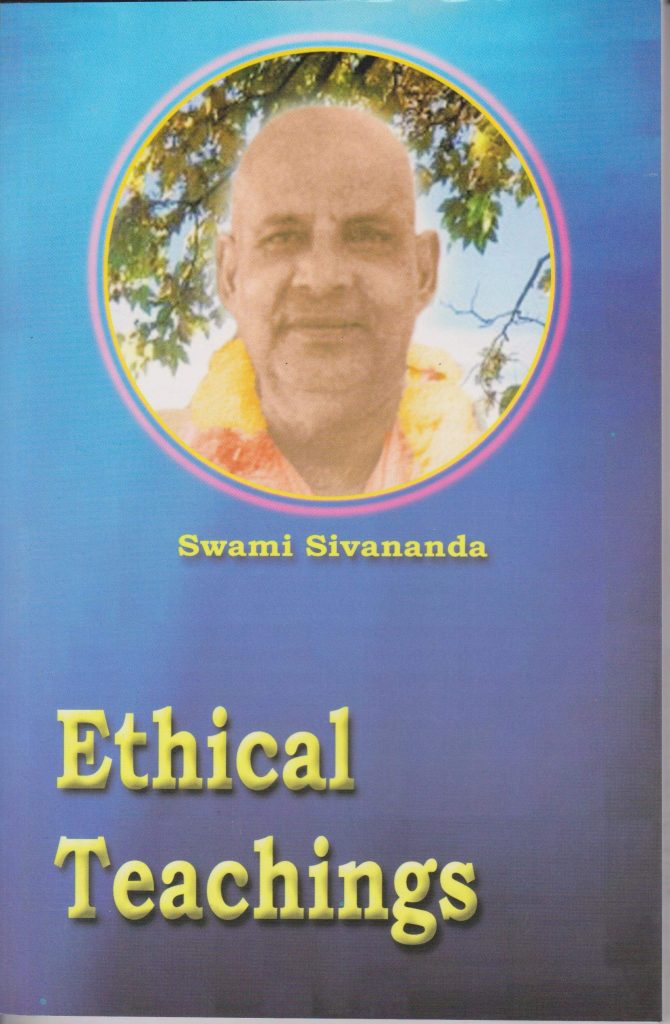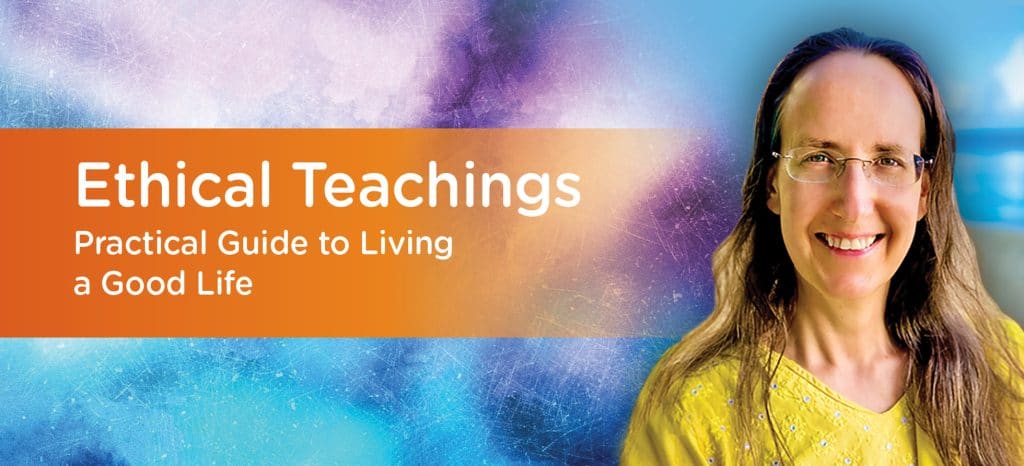- LIVE ONLINE PROGRAM
September 19 – December 19, 2022
Ethical Teachings:
Practical Guide to Living a Good Life
with Rukmini Chaitanya
Rukmini Chaitanya
12 WEEKLY SESSIONS, Mondays, 12:30 – 2:00 pm ET
Zoom Link and Class Recordings
Course Description:
“Ethics is morality. Morality is the gateway to God-realisation. It is the master-key of religion. He who leads a moral or virtuous life, attains freedom, perfection, or moksha.”
– Swami Sivananda, “Ethical Teachings“
Discover the foundation of every spiritual practice: ethics, also known as morality and the science of conduct. When we lead a moral and just life, progress on our spiritual path is unimpeded; it is quick and efficient. Living according to a set of values, living ethically, helps us feel aligned with our soul’s purpose.
When we feel aligned with our soul’s purpose, we do not resist the lessons that life gives us. Furthermore, we are overall happier, as our minds are not weighed down by self-deprecating thoughts and questions regarding our own moral characters — this being the stuff of nightmares that keeps many a man up at night or pushes him (or her) toward bad habits, dependencies, and other actions that lead to more misery, more suffering, and less spiritual practice.
Join this 12 week course with Rukmini Chaitanya to explore the conduct of right life and to discuss and receive the answers to such soul-stirring questions as What is ethics? and Who is Good and Virtuous? Discover the benefits of living a life aligned with your moral obligations and sentiments. Moreover, learn practical tools that will help you enact the life you deserve to live fully right here and now, a life of sweet speech, honesty and faith, moderation, tolerance, fortitude, and self-control.
Students will have the opportunity to receive personal guidance from Rukmini Chaitanya on their studies.


What is the goal of life, if not to seek happiness? If you too are desirous of a state of perpetual happiness and joy, you must cultivate the state of mind that supports it. To cultivate that state of mind, you must first cultivate a character that can sustain such a state of mind.
We must be careful about what we feed the mind in terms of our actions, desires, and thoughts; this is where ethics come in as the foundation of the pursuit of a good life, a life of happiness.
Ethics is a relative science; what is good for one man may not be good for another man and what is good at one time may not be good at another time and at another place. Thus, a deep study of what ethics is, is necessary for every human to contemplate and reflect upon. Partaking in deep rumination on morality is what enables one to be able to formulate their own path of virtue. This course has its source material taken from the concise manual on the subject matter, Ethical Teachings by Swami Sivananda.
The state of mind found in a happy, successful man is one of complete Presence. Happiness, after all, is only found in one place: the present. Living an ethical life, a life marked by right conduct, helps keep the mind calm and peaceful. By living such a life, one finds that their mind is no longer tormented by mistakes committed in the past or concerns about faults found in possible futures; instead, the mind becomes rooted with certainty in the now. When this occurs, everything comes easily and even the hard times pass by without fanfare like clouds in the sky.
Such a life as the one described above isn’t only possible, it is owed to you. So grasp it; grasp it now by applying yourself to the study of ethics and take back your power to live a life of happiness, peace, and complete freedom.
What this course covers...
- What is Ethics? — differences between eastern and western ethics, ethical culture, dharma, foundation of ethics, self-realization and the ultimate meaning of ethics
- Basis of Ethics — character, conduct, and behavior; nature of conduct, ethical discipline, Samnya Dharma, right and wrong; truth and forms of truth; conscience and nature of conduct
- Morality — benefits; moral obligation and moral sentiments; difference between moral, immoral, and non-moral actions; moral life and moral standard; Dharma Sankata, moral judgement, crime and punishment
- Conduct of Right Life — Who is Good and Virtuous? plus insights into: charity, Annandana Yajna, penance, friendship (Maitri), sweet speech, honesty and faith, moderation, tolerance, fortitude, self-control
- Enemies of Ethics — the nature of a vicious man and an in-depth look at: anger, covetousness, drinking and drugs, gambling, prostitution, and the eradication of vices
- Special Ethics — morality in the following fields: legal ethics, medical ethics, business ethics, industrial ethics, international ethics, domestic ethics, and spiritual progress
- Duties of Man — general duties of humankind and more specifically: the duties of a Brahmachari; the duties of a Householder (Grihasti); the duties of a Vanaprastha; the duties of a Sannyasin
- Ethical Teaching — essays on topics such as: Morality, The Basis of Spiritual Life; Dharma Confers Wealth and Happiness; Character is Power; Truth Alone Reigns Supreme; Control of Anger; When Man Becomes One with the Divine; How to Purify Heart and Mind; Humility, The Path of Immortality... and many more!
The specifics of what you'll learn in these 10 weeks...
- What is Ethics? Including ethical science and the foundation of ethics, plus the distinction between ethics in the East and West and the particulars of ethical culture.
- A query on Dharma, with a look at definitions of dharma, how to live life dharmically, the meaning of right conduct and the purity of motive.
- The ultimate meaning of Ethics, which is none other than the highest goal in life: Self-Realization.
- The Basis of Ethics, including an in-depth look at truth, forms of truth, the differences between right and wrong, the definition of a conscience and what it means to stick to your promise.
- Character, conduct, and behavior plus the basis of conduct, the nature of conduct, ethical discipline and Samanya Dharma (the general Dharma or the general law for all men)
- Diving deep into the questions surrounding morality, including distinguishing between moral obligation and moral sentiments and understanding what constitutes a moral, immoral, and non-moral action.
- The benefits of a moral life and moral standard and how to apply the ways of morality to improve your own life now.
- Dharma Sankata or quandaries in Dharma — sometimes one is puzzled as to what to do in certain circumstances or there is a conflict of duty; this section of the book thoroughly deals with common quandaries and how to solve them on a personal basis without compromising your values.
- Who is Good and Virtuous? with a study of the definition of virtue, the benefits of living a virtuous life, and the specifics of virtuous traits such as honesty and faith, moderation, tolerance, fortitude, and self-control... with specifics on how to practice self-control.
- How to develop charity and the benefits of practices such as Annadana Yajna (or distribution of food).
- The enemies of ethics and how to avoid them; a deep study of the nature of a vicious man with a prolonged look at the qualities of anger and covetousness and the negative effects of the habits of drinking, drugs, gambling, and prostitution... plus a practical guide as how to eradicate these and other vices.
Additional Information:
- Offered as 12 weekly sessions on Mondays from 7:00 to 8:30 pm ET on the following dates: September 19, October 3, 10, 17, 22, 24, 31, Nov 7, 14, 21 & 28, Dec 5 & 12th.
- This program is offered live through Zoom webinar with the availability for students to interact through Q&A with the presenter.
- For enrolled students, a video recording will be available after each class in the event you miss a class or would like to review the content.
- It is possible to register and take the course at any time. You can catch up on any classes you miss with the recordings.
Requirements and Recommendations:
- No experience necessary. This program is open to beginners as well as advanced practitioners.
- Viewing Device: Desktop or laptop computer will provide the best experience, although you can also connect via a tablet or smartphone.
- Internet connection: High-speed broadband wired or wireless is best.
- Video: Download Zoom to your computer, or install the Zoom app to your device. For interactive group sessions, a webcam or integrated camera will allow others to feel more connected with you.
- Audio: Headphone speakers are recommended. If you wish to participate vocally, a headset with a microphone will be ideal.
Course Includes:
- 24 hours of on-demand video.
- 10 live 90 minute sessions.
- Live and recorded guided practices.
- Feedback and personal guidance on student’s home practices.
- Availability to ask questions about the studies and practices between classes.
- Course Manual.




Rukmini Chaitanya
Rukmini Chaitanya is a senior staff member of the Sivananda Ashram Yoga Retreat Bahamas, and the personal assistant to Swami Swaroopananda, the Acharya, or spiritual director of the Ashram. She regularly teaches the Bhagavad Gita during the Sivananda Yoga Teacher training as well as other courses on the Bhagavad Gita, Vedanta, positive thinking, meditation, and yoga philosophy.
Rukmini Chaitanya is known for her enthusiastic and inspiring teaching style as well as for her devotion to the lineage and the scriptures. She is dedicated to each of her students and has an innate desire to share knowledge with them. She brings a great deal of clarity to every topic and is highly appreciated for her capacity to unfold complicated topics and present them in a coherent and pure way.
